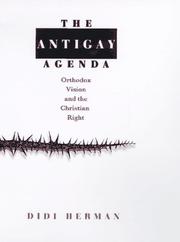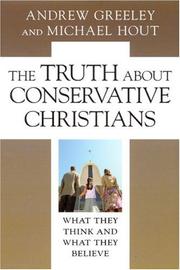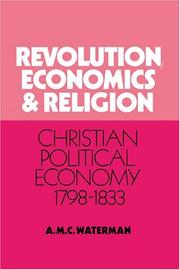| Listing 1 - 5 of 5 |
Sort by
|
Book
ISBN: 0801852978 Year: 1996 Publisher: Baltimore ; London Johns Hopkins University Press
Abstract | Keywords | Export | Availability | Bookmark
 Loading...
Loading...Choose an application
- Reference Manager
- EndNote
- RefWorks (Direct export to RefWorks)

ISBN: 0226327647 Year: 1997 Publisher: Chicago London University of Chicago Press
Abstract | Keywords | Export | Availability | Bookmark
 Loading...
Loading...Choose an application
- Reference Manager
- EndNote
- RefWorks (Direct export to RefWorks)
In The Antigay Agenda, Didi Herman probes the values, beliefs, and rhetoric of the organizations of the Christian Right. Tracing the emergence of their antigay agenda, Herman explores how and why these groups made antigay activity a top priority, and how it relates to their political history. [publisher's description]
Homosexuality --- Fundamentalism --- Conservatism --- Religious aspects --- Christianity. --- History --- 20th century --- Christianity --- Homosexuality - Religious aspects - Christianity. --- Conservatism - Religious aspects - Christianity. --- Christian fundamentalism --- Protestant fundamentalism --- Religious fundamentalism (Protestantism) --- Protestantism --- Theology, Doctrinal --- Evangelicalism --- Millennialism --- Modernist-fundamentalist controversy --- Same-sex attraction --- Sexual orientation --- Bisexuality --- Conservativism --- Neo-conservatism --- New Right --- Right (Political science) --- Political science --- Sociology --- Religious aspects&delete&
Book
ISBN: 2708968572 9782708968578 Year: 2006 Publisher: [Toulouse]: Privat,
Abstract | Keywords | Export | Availability | Bookmark
 Loading...
Loading...Choose an application
- Reference Manager
- EndNote
- RefWorks (Direct export to RefWorks)
Religious right --- Conservatism --- Christianity and politics --- Droite religieuse --- Conservatisme --- Christianisme et politique --- Religious aspects --- Christianity --- Aspect religieux --- Christianisme --- Evangelicalism --- Protestant churches --- US Politics --- Christian Right Parties --- Religious right - United States --- Conservatism - United States --- Conservatism - Religious aspects - Christianity --- Christianity and politics - United States --- Christianity and politics - Protestant churches --- Evangelicalism - United States

ISBN: 9780226306629 0226306623 Year: 2006 Publisher: Chicago University of Chicago press
Abstract | Keywords | Export | Availability | Bookmark
 Loading...
Loading...Choose an application
- Reference Manager
- EndNote
- RefWorks (Direct export to RefWorks)
Ever since the reelection of President Bush, conservative Christians have been stereotyped in the popular media: Bible-thumping militants and anti-intellectual zealots determined to impose their convictions on such matters as evolution, school prayer, pornography, abortion, and homosexuality on the rest of us. But conservative Christians are not as fanatical or intractable as many people think, nor are they necessarily the monolithic voting block or political base that kept Bush in power. Andrew M. Greeley and Michael Hout's eye-opening book expertly conveys the complexity
Sociology of religion --- Christian church history --- United States --- Christian conservatism --- -Conservatism --- -28 <73> --- 329.11 <73> --- Conservativism --- Neo-conservatism --- New Right --- Right (Political science) --- Political science --- Sociology --- Conservatism --- Religious right --- Religious aspects --- -Christianity --- Christelijke kerken, secten. Kristelijke kerken--(algemeen)--Verenigde Staten van Amerika. VSA. USA --- Conservatieven--Verenigde Staten van Amerika. VSA. USA --- Christianity. --- Christian conservatism - United States. --- Christian conservatism. --- Conservatism. --- Conservatism - Religious aspects - Christianity. --- Christianity --- Religion --- Philosophy & Religion --- 329.11 <73> Conservatieven--Verenigde Staten van Amerika. VSA. USA --- 28 <73> --- Religious aspects&delete&

ISBN: 0521394473 0521030382 0511521502 0511832583 Year: 1991 Publisher: Cambridge New York Sydney Cambridge University Press
Abstract | Keywords | Export | Availability | Bookmark
 Loading...
Loading...Choose an application
- Reference Manager
- EndNote
- RefWorks (Direct export to RefWorks)
Malthus's Essay on Population was seen in 1798 as a complete refutation of Godwin and all 'Jacobin' ideology. It proved that a state of equality and justice for all was unfeasible; and it demonstrated the inevitability and beneficence of private property and political institutions. But its central theme, the dominance of scarcity in human affairs, presented the theological 'problem of evil' in novel and threatening form. For thirty-five years both the economics and the theology of the Essay were modified and refined: first by Paley, Sumner and Malthus himself, and later by Copleston, Whately and Chalmers. The result was 'Christian Political Economy': an ideological alliance of political economy and Christian theology, congenial to a new 'liberal-conservatism' in the early nineteenth century, which found middle ground between the ultra-tory defence of the ancien régime and a 'radical' repudiation of existing institutions. Professor Waterman analyses this story of the 'intellectual repulse of revolution', and describes the ideological alliance of political economy and Christian theology after 1798.
Malthus, Thomas Robert --- 32.001 --- Conservatism --- -Theodicy --- -Conservatism --- -Christian sociology --- -Christianity and politics --- -Economics --- -Revolutions --- -#SBIB:321H440 --- Insurrections --- Rebellions --- Revolts --- Revolutionary wars --- History --- Political science --- Political violence --- War --- Government, Resistance to --- Economic theory --- Political economy --- Social sciences --- Economic man --- Christianity --- Church and politics --- Politics and Christianity --- Politics and the church --- Christian social theory --- Social theory, Christian --- Sociology, Christian --- Sociology --- Conservativism --- Neo-conservatism --- New Right --- Right (Political science) --- Evil, Problem of (Theology) --- God --- Permissive will of God --- Problem of evil (Theology) --- Good and evil --- Politieke wetenschap --- -History of doctrines --- -Religious aspects --- -Christianity --- -History --- -Protestant churches --- -Congresses --- Religious aspects --- Westerse politieke en sociale theorieën vanaf de 19e eeuw: christelijke gedachte: opvattingen over economie en arbeid --- Political aspects --- Permissive will --- Will, Permissive --- Malthus, T. R. --- 32.001 Politieke wetenschap --- Christianity and politics --- Christian sociology --- Economics --- Revolutions --- Theodicy --- #SBIB:321H440 --- Protestant churches --- History of doctrines --- Great Britain --- Politics and government --- 1789-1820 --- 1800-1837 --- Sociology, Christian - Great Britain - History of doctrines. --- Christianity and politics - Protestant churches. --- Economics - Religious aspects - Christianity - History of doctrines. --- Malthus, T. R. (Thomas Robert), 1766-1834. An essay on the principle of population. --- Theodicy - History of doctrines. --- Conservatism - Great Britain - History. --- Conservatism - Religious aspects - Christianity - History of doctrines. --- Revolutions - Religious aspects - Christianity - History of doctrines. --- Great Britain - Politics and government - 1789-1820. --- Great Britain - Politics and government - 1800-1837. --- Social Sciences --- Political Science
| Listing 1 - 5 of 5 |
Sort by
|

 Search
Search Feedback
Feedback About UniCat
About UniCat  Help
Help News
News